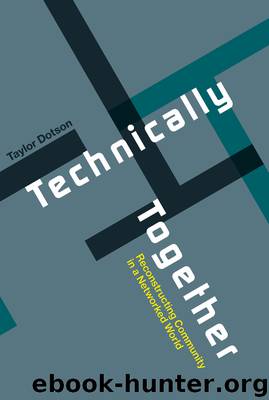Technically Together by Dotson Taylor;

Author:Dotson, Taylor;
Language: eng
Format: epub
Tags: Politics of technology; Communitarian technology; Community; Reconstructivism; Networked individualism; Science and technology studies; STS; Philosophy of technology; social construction of technology; partisan scholarship; the good life; autonomous technology; reverse adaptation; Webs of ties; thick community; Jane Jacobs; Ray Oldenburg; democratic governance; Infrastructure; atomization; technological liberalism; embedding; socialization; self-reliance; communities of repair; zoning; suburbia; suburb; Perverse incentives; obduracy; new urbanism; intelligent trial and error; cooperatives; Oneida; social networking; society; Facebook
Publisher: MIT Press
Published: 2017-09-08T04:00:00+00:00
7
Lessening the Obduracy of Networked Urbanity
Achieving societies that enable and encourage thick community requires making everyday technologies more compatible with it. Today’s built environments too often discourage neighboring, walking, and dense networks of local social bonds; media and communication devices tend to support cocooning better than communing; infrastructures organize citizens as unencumbered selves; and dominant child-rearing techniques help enculturate an overdeveloped attraction to feelings of self-reliance and privacy. Instituting more communitarian technologies, however, is no simple task. Significant barriers stand in the way. Communitarians will need to direct much of their efforts to attacking the underlying social, economic, cultural, and political drivers of the technological thinning of community life.
Viewing technological change as sociopolitical, not just technical, remains uncommon in popular debate and discourse. Many people embrace a fairytale understanding of innovation, believing that the purportedly “best” technologies emerge from the ostensibly “objective” processes of industrial design and market-led investment and diffusion. This belief often rears its head in the widespread claim that governments need to take a “hands-off” approach to innovation and not interfere in the “free market,” even though economists long ago revealed the underlying Panglossian logic of such ideas.1 The following chapters aim to undermine such fairytale understandings of innovation, namely with respect to communitarian technologies.
The stability and direction of technological development is guided by entrenched, pervasive, and often significantly flawed patterns of thought; systems of regulation, tax, and subsidy; already established and “sunk” infrastructures; as well as the interests of powerful sociopolitical actors. In the language of STS, the sociotechnical status quo is often obdurate, or difficult to change, and certain technological trajectories gain more momentum than others, often leading to rapid sociotechnical changes but in fairly constrained ways.2 For instance, the ongoing and rapid innovation of frequently toxic petroleum-based chemical products contrasts the slow development of more environmentally benign and nontoxic alternatives to petroleum-based products through green chemistry. This has not been simply because green chemical processes, including the use of water or supercritical carbon dioxide as a solvent, lack promise or cannot perform adequately. Rather, the slowness of green chemical innovation partly stems from the existence of already established petroleum-processing and refining infrastructures as well as the lack of attention paid toward toxicology and chemistry ethics in university curricula and professional certification examinations.3 Green chemistry is hindered more by the sociopolitical challenges in altering ways of thinking among chemists, funding organizations, educators, and business managers and the costs of retooling industrial civilization as we know it than the technical challenges entailed in getting green chemistry to work. The attempt to realize more communitarian technologies is no different.
In the next chapters, I provide a reconstructivist look at community within technological societies.4 I discuss various barriers to more thickly communitarian technologies: cognitive, technical, cultural, sociopolitical, and economic. Such technologies are hindered by ways of (non)thinking, material or physical constraints, cultural preferences, the interests and dysfunctions of powerful political actors and institutions, as well as wrongheaded policies. Wherever possible, I suggest ways of mitigating or lessening the effects of these barriers.
Download
This site does not store any files on its server. We only index and link to content provided by other sites. Please contact the content providers to delete copyright contents if any and email us, we'll remove relevant links or contents immediately.
| Anthropology | Archaeology |
| Philosophy | Politics & Government |
| Social Sciences | Sociology |
| Women's Studies |
Cecilia; Or, Memoirs of an Heiress — Volume 1 by Fanny Burney(32550)
Cecilia; Or, Memoirs of an Heiress — Volume 2 by Fanny Burney(31950)
Cecilia; Or, Memoirs of an Heiress — Volume 3 by Fanny Burney(31933)
The Great Music City by Andrea Baker(31919)
We're Going to Need More Wine by Gabrielle Union(19038)
All the Missing Girls by Megan Miranda(15967)
Pimp by Iceberg Slim(14490)
Bombshells: Glamour Girls of a Lifetime by Sullivan Steve(14062)
For the Love of Europe by Rick Steves(13955)
Talking to Strangers by Malcolm Gladwell(13353)
Norse Mythology by Gaiman Neil(13352)
Fifty Shades Freed by E L James(13236)
Mindhunter: Inside the FBI's Elite Serial Crime Unit by John E. Douglas & Mark Olshaker(9327)
Crazy Rich Asians by Kevin Kwan(9281)
The Lost Art of Listening by Michael P. Nichols(7498)
Enlightenment Now: The Case for Reason, Science, Humanism, and Progress by Steven Pinker(7308)
The Four Agreements by Don Miguel Ruiz(6748)
Bad Blood by John Carreyrou(6615)
Weapons of Math Destruction by Cathy O'Neil(6268)
